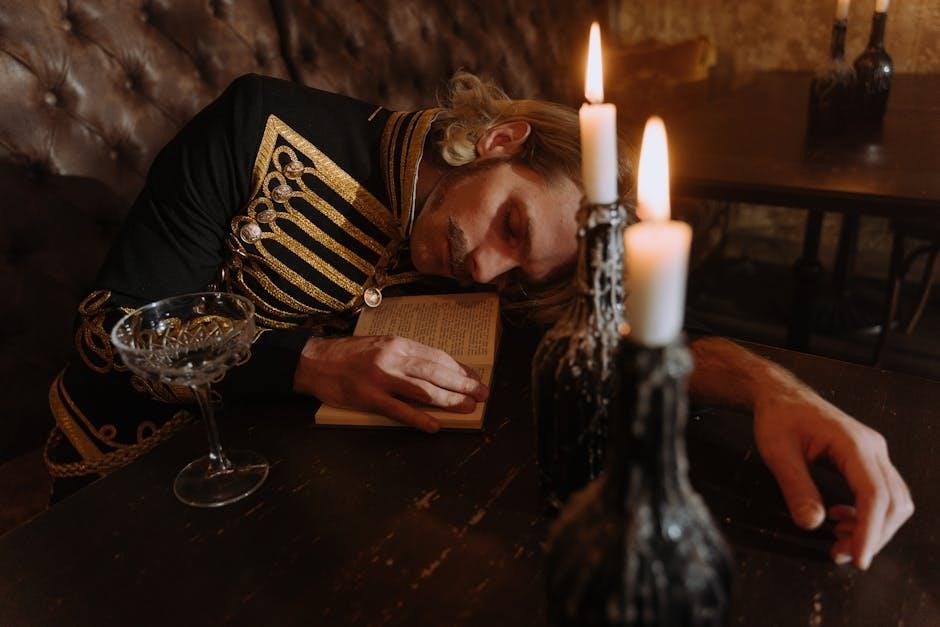
Night by Elie Wiesel is a poignant Holocaust memoir detailing the author’s harrowing experiences during World War II. Available as a PDF, the book remains a vital historical and educational resource, offering a deeply personal account of survival, faith, and humanity. Its enduring relevance continues to resonate globally, making it a cornerstone of Holocaust literature and education.
1.1 Overview of the Book
Night by Elie Wiesel is a haunting memoir published in 1956, recounting the author’s experiences as a teenager in Auschwitz-Birkenau during World War II. The book vividly describes the horrors of the Holocaust, loss of faith, and the struggle for survival. Available as a PDF, it remains a critical educational resource, offering a firsthand account of one of history’s darkest periods;
1.2 Significance of the Memoir
Elie Wiesel’s Night holds profound significance as a Holocaust memoir, providing an unflinching account of its atrocities. The book bridges historical documentation with personal narrative, serving as a crucial educational tool. Its PDF availability ensures accessibility, preserving Wiesel’s eyewitness testimony and promoting awareness of the Holocaust’s horrors, fostering empathy and understanding across generations globally.

Historical Context of the Holocaust
The Holocaust, a systematic persecution of Jews by the Nazis, occurred during World War II (1939–1945). Elie Wiesel’s memoir vividly captures this dark era, shedding light on the atrocities and the harrowing experiences of millions, making it a crucial historical document for understanding this tragic period.
2.1 The Holocaust: A Brief Background
The Holocaust was the systematic persecution and extermination of six million Jews by the Nazi regime during World War II (1939–1945). Initiated by Adolf Hitler, it involved concentration camps, mass executions, and forced labor. Elie Wiesel’s memoir, Night, provides a personal account of this genocide, highlighting its horrors and the immense human suffering endured.
2.2 Elie Wiesel’s Personal Experience
Elie Wiesel, a Holocaust survivor, was deported to Auschwitz at age 15. He endured unimaginable suffering, witnessing the death of his family and facing brutal conditions in concentration camps. His memoir, Night, vividly recounts his personal trauma, loss of faith, and struggle for survival, providing a harrowing yet essential account of the Holocaust’s atrocities.
Plot Summary of Night
Night by Elie Wiesel recounts Eliezer’s harrowing journey from his hometown of Sighet to Auschwitz-Birkenau, detailing the horrors of the Holocaust and his struggle with faith.
3.1 Early Life in Sighet
In Sighet, Transylvania, Eliezer, a young Orthodox Jew, studies the Talmud and Kabbalah, surrounded by a close-knit family. His peaceful life is disrupted by the invasion of Nazi forces, marking the beginning of his tragic journey. This period sets the stage for his eventual deportation and the loss of innocence that follows. The community’s tranquility is shattered by war.
3.2 The Journey to Auschwitz-Birkenau
Eliezer and his family are forcibly loaded onto overcrowded cattle cars, enduring days without food, water, or sanitation. The harrowing journey to Auschwitz-Birkenau is marked by desperation and despair. Upon arrival, they face the terrifying spectacle of the concentration camp, where families are separated, and the reality of the Holocaust hits them full force, shattering all hope of normalcy.
3.4 Life in the Concentration Camps
Eliezer endures unimaginable horrors in Auschwitz-Birkenau, where prisoners face brutal conditions, forced labor, and constant terror. The camps strip individuals of their humanity, reducing them to mere numbers. Eliezer witnesses the selections, crematoriums, and the dehumanizing treatment of inmates. The harsh realities of camp life test his physical and emotional limits, challenging his faith and will to survive.
Major Themes in Night
Night explores profound themes such as faith and its crisis, hope amidst despair, dehumanization, and the loss of identity, reflecting the Holocaust’s ethical and emotional depths.
4.1 Faith and Crisis of Faith
In “Night,” Elie Wiesel grapples with his faith in a benevolent God amidst unimaginable suffering. The atrocities of the Holocaust challenge his religious beliefs, leading to a profound crisis. Witnessing the hanging of a child and the brutality around him, Elie questions divine justice, reflecting the broader theological struggles of Holocaust survivors. This internal conflict is central to the memoir.
4.2 Hope and Survival
Hope is a fragile yet persistent theme in “Night.” Despite the unimaginable horrors, Eliezer clings to hope as a means of survival. The support of his father and the resilience of other prisoners illustrate how hope, though often tested, sustains them. This theme underscores the human spirit’s capacity to endure even in the darkest circumstances, as depicted in the PDF version of the book.
4.3 Dehumanization and Loss of Identity
The Holocaust memoir vividly portrays the systematic dehumanization of prisoners, stripping them of dignity and identity. Uniforms replaced names, reducing individuals to mere numbers. The brutal conditions and constant degradation eroded their sense of self, highlighting the psychological and emotional toll of such treatment. This theme in “Night” underscores the profound loss of humanity during the Holocaust, as detailed in the PDF book.
Symbolism in the Book
Elie Wiesel uses darkness, fire, and silence as potent symbols, reflecting the moral void, destruction, and unspoken horrors of the Holocaust, as seen in the PDF book.
5.1 Night and Darkness
Night and darkness are recurring symbols in Elie Wiesel’s memoir, representing the moral and emotional void experienced during the Holocaust. Darkness symbolizes the absence of hope, while night embodies the enduring trauma and fear. These elements create a haunting atmosphere, mirroring the psychological and physical suffering of the victims, as vividly portrayed in the PDF book.
5.2 Silence and the Unspoken
Silence and the unspoken in Night reflect the inability to articulate unimaginable horrors. The PDF book highlights how silence becomes a coping mechanism and a form of resistance, yet it also signifies the breakdown of communication and the dehumanizing effects of the Holocaust, leaving survivors with unspoken trauma and unanswered questions.
5.3 Fire and Burning
Fire and burning in Night symbolize destruction and despair. The PDF book vividly depicts the horrors of crematoria and burning bodies, serving as a constant reminder of the atrocities committed. Fire also represents loss of innocence and faith, as Elie Wiesel witnesses the literal and metaphorical burning of his world, leaving lasting emotional and psychological scars.
Elie Wiesel’s Writing Style
Elie Wiesel’s writing is unique, blending a direct, powerful narrative with profound reflections. His simple yet evocative language conveys the intensity of his experiences, creating vivid imagery that immerses readers in the emotional depth of his story.
6.1 Unique Narrative Approach
Elie Wiesel’s narrative approach in Night is both direct and deeply reflective, blending personal experience with philosophical introspection. His use of simple, powerful language creates vivid imagery, immersing readers in his emotional and psychological journey. This approach ensures the memoir’s authenticity and emotional impact, making it a compelling and unforgettable account of the Holocaust.
6.2 Use of Language and Imagery
Wiesel employs vivid, haunting imagery to convey the horrors of the Holocaust, creating a powerful emotional connection with readers. His sparse yet evocative language captures the stark brutality and despair, while recurring motifs like darkness and silence underscore the existential void. The crematoria, death marches, and dehumanizing conditions are rendered with unflinching clarity, making the unimaginable feel tragically real.
Key Characters in Night
Eliezer, the protagonist, narrates his harrowing Holocaust experiences; His father struggles to survive alongside him, while Moshe the Beadle serves as a spiritual guide, shaping Elie’s early beliefs.
7.1 Eliezer (Elie)
Eliezer, often called Elie, is the protagonist and narrator of Night. He is a young Jewish boy from Sighet, Transylvania, who experiences the horrors of the Holocaust. The memoir chronicles his emotional and spiritual struggles, including his loss of faith and identity. Elie’s relationship with his father is central to the story, highlighting themes of survival, hope, and the bond between parent and child.
7.2 Moshe the Beadle
Moshe the Beadle is a poor, humble Jew in Sighet who is deported early in the story. He later escapes and returns to warn the community about Nazi atrocities, but his accounts are dismissed as madness. His warnings serve as a pivotal moment, highlighting the disbelief and naivety of the townspeople, including Eliezer and his family, about the impending danger.
7.3 Elie’s Father
Elie’s father, a respected figure in Sighet, is a man of tradition and duty. He is initially reluctant to heed warnings of danger, believing in the community’s safety. His relationship with Elie is strained by his strict adherence to tradition, but in the concentration camps, Elie’s father becomes a symbol of endurance and the bond between them deepens amidst unimaginable hardship.

Reception and Impact of the Book
Night by Elie Wiesel gained significant attention after Oprah’s Book Club selection, becoming a New York Times best-seller. Its profound impact continues to educate and inspire, fostering global dialogue about the Holocaust and humanity’s resilience.
8.1 Initial Reception and Publishing Challenges
Night faced significant publishing challenges initially, struggling to find a publisher due to its harrowing content. Despite its powerful narrative, the memoir received lukewarm responses upon its 1956 release. It wasn’t until years later, with growing awareness of Holocaust literature, that the book began to gain the recognition it deserved, ultimately becoming a cornerstone of historical testimony.
8.2 Oprah’s Book Club Selection
Oprah Winfrey’s selection of Night for her book club in 2006 significantly boosted its popularity. Featuring a new translation by Marion Wiesel, the book included the Oprah’s Book Club sticker, drawing new readers. This endorsement elevated the memoir’s visibility, introducing it to a broader audience and sparking meaningful discussions about its themes and historical significance.
8.3 New York Times Best-Seller Status
Night by Elie Wiesel achieved remarkable success, spending 80 weeks on the New York Times best-seller list after Oprah’s endorsement. Its removal from the list sparked discussion, though its popularity endured. The memoir’s inclusion, aided by Marion Wiesel’s 2012 translation, highlighted its lasting impact and relevance, cementing its place as a vital work of Holocaust literature.

Translations and Editions
Night was originally written in Yiddish as Un di Velt Hot Geshvigen. Marion Wiesel’s 2006 English translation revitalized its reach. PDF editions are widely accessible, including versions with introductions by Oprah Winfrey, enhancing its global impact and readability for new generations of readers.
9.1 Original Yiddish Version
Elie Wiesel’s memoir was first written in Yiddish as Un di Velt Hot Geshvigen (And the World Remained Silent). Completed in 1956, it was his initial manuscript, detailing his Holocaust experiences. The Yiddish version, more expansive than later editions, was initially overlooked but later recognized for its raw, unfiltered emotion and detailed accounts of life during the Holocaust.
9.2 English Translations
Night was first translated into English in 1960, making Elie Wiesel’s Holocaust memoir accessible to a broader audience. This translation played a crucial role in spreading awareness of the Holocaust, allowing readers worldwide to connect with Wiesel’s personal story. The English version has since become a cornerstone of Holocaust education and literature, ensuring its enduring impact and relevance.
9.3 Marion Wiesel’s 2012 Translation
Marion Wiesel’s 2012 translation of Night marked a significant milestone, offering a fresh perspective while preserving the memoir’s emotional depth. As Elie Wiesel’s wife, her translation brought a personal touch, ensuring the original’s power resonated anew. This version was featured in Oprah’s Book Club, further amplifying its reach and impact, making it a vital contribution to Holocaust literature’s accessibility and enduring relevance.

Awards and Recognition
Elie Wiesel’s Night earned the Nobel Peace Prize, honoring his advocacy for human rights and peace. His literary excellence was widely acknowledged with numerous prestigious awards.
10.1 Nobel Peace Prize
Elie Wiesel was awarded the Nobel Peace Prize in 1986 for his tireless advocacy of human rights and peace. His memoir Night played a crucial role in highlighting the atrocities of the Holocaust, making him an internationally recognized figure in the fight against oppression and hatred. His work continues to inspire global awareness and reconciliation.
10.2 Other Literary Awards
Beyond the Nobel Peace Prize, Night earned Elie Wiesel the National Jewish Book Award and the Prix Medicis. The memoir’s profound impact led to its selection by Oprah’s Book Club, further amplifying its reach. Its inclusion as a New York Times best-seller and the release of Marion Wiesel’s 2012 translation ensured its enduring literary significance and accessibility to new generations.

Legacy of Night
Night remains a powerful Holocaust memoir, widely studied in schools. Its raw narrative educates future generations about the atrocities of the Holocaust, fostering empathy and humanity.
11.1 Educational Significance
Night is a cornerstone in Holocaust education, widely taught in schools for its vivid portrayal of history. The PDF version ensures accessibility, making it a crucial tool for students to understand the atrocities of WWII and reflect on human resilience, fostering empathy and historical awareness across generations.
11.2 Cultural and Historical Impact
Night has left an indelible mark on culture and history, serving as a testament to Holocaust survivors; Its widespread availability in PDF format has broadened its reach, ensuring the atrocities of WWII are remembered and studied, while inspiring global dialogue on human rights, tolerance, and the prevention of future genocides.
Night by Elie Wiesel remains a powerful memoir, offering a harrowing account of the Holocaust. Its PDF availability ensures accessibility, preserving its legacy as a vital historical and educational resource.
12.1 Summary of Key Points
Night by Elie Wiesel is a harrowing Holocaust memoir available as a PDF, detailing the author’s survival in Nazi concentration camps. The book explores themes of faith, hope, and humanity, serving as a vital historical and educational resource. Its accessibility ensures Wiesel’s story continues to educate and remind future generations of the atrocities of the Holocaust, preserving its legacy.
12.2 Reflection on the Book’s Enduring Importance
Night remains a timeless account of the Holocaust, offering a deeply personal perspective on survival and humanity. Its availability as a PDF ensures accessibility, preserving Elie Wiesel’s voice for future generations. The memoir’s unflinching portrayal of atrocities and its exploration of faith and hope continue to resonate, making it an essential work in understanding one of history’s darkest chapters.